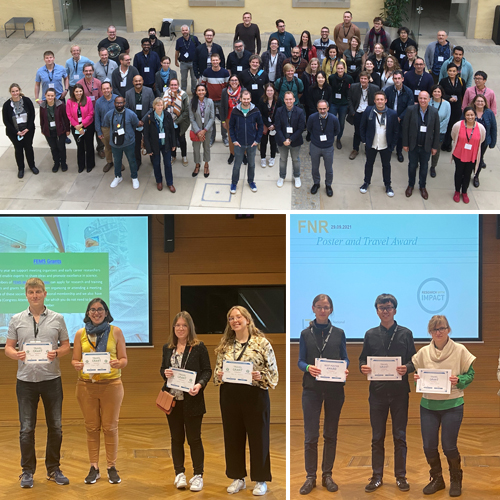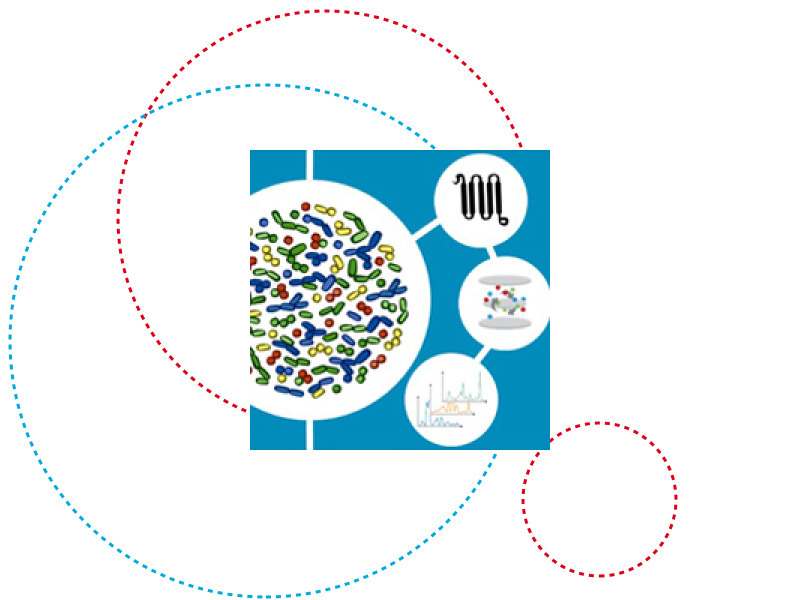At the end of September, researchers from the Systems Ecology group at the LCSB organised the fourth International Metaproteomics Symposium at the Neumünster Abbey in Luxembourg. This 3-day event was the occasion to bring together an international community using high-resolution molecular approaches to study microbiomes, and more particularly metaproteomics, in a wide range of research fields. This first hybrid event – combining online and on-site activities – since the start of the COVID-19 pandemic was a success: 80 participants from all over the world attended the scientific presentations and poster sessions, and explored future perspectives for the fast-growing field of metaproteomics.
Metaproteomics involves the large-scale identification and quantification of proteins from microbial communities. As microbial communities play fundamental roles in the Earth’s biogeochemical cycles as well as in human health and disease, and as proteins constitute the main entities which catalyse reactions and interface with the human immune system, metaproteomics is fundamental to understanding the roles and functions of microbes in, on and around us.
First in-person meeting in two years
The International Metaproteomics Symposium is the leading event in the field of metaproteomics and related microbiome studies. It provides a platform for the international community to share the latest results obtained by using metaproteomic methods in their respective fields – from studying soil or the oceans to exploring the human microbiome – as well as discuss recent technological innovations and newly developed bioinformatic tools.
Usually a biyearly occurrence, the fourth edition has been a long time coming. Due to the pandemic, it was delayed until, at the end of September, the situation finally allowed organisers Dr Benoît Kunath and Prof. Paul Wilmes to welcome the participants in Luxembourg. “Considering the context, we are very happy with the turn-out,” explains Dr Kunath. “Sixty participants could join us at the Neumünster Abbey while twenty more gathered online. And we received very positive feedback from the participants who hadn’t been able to attend an in-person scientific event in the last two years.”
On top of allowing researchers to finally meet after this long gap, the symposium was the occasion to bring together seven invited speakers with experimental or bioinformatics backgrounds. They tackled topics such as metaproteomics in health and diseases or environmental studies and novel methods for metaproteomics (find out more about the programme). Ample time was also given for networking and interactions which lead to several collaborations. Discussion about the community projects and efforts were fruitful as well, as the official board of the International Metaproteomics Initiative was chosen during the symposium. Benoît Kunath and Paul Wilmes were respectively elected as administrator and scientific advisor.
A very active international community
The growing international community has indeed become more organised over the years and has now come together in the form of the International Metaproteomics Initiative. This structure will disseminate information about advancements and applications in the field through collaborative networking. It aims to be a central hub and an open meeting place where newcomers and experts alike can interact. The initiative will also help to standardise experimental and bioinformatic methodologies and accelerate their development. Since February 2021, it is recognised as an official European Proteomics Association (EuPA) Initiative.
The LCSB is a founding member of the International Metaproteomics Initiative and is strongly involved in community-wide projects. As an example, several members of the LCSB – Pedro Teixeira Queiros, Patrick May, Paul Wilmes and Benoît Kunath – figure as co-authors in a first paper collaboratively written by the community and soon to be published in Nature Communications (Microbiome). LCSB researchers are also contributing to another upcoming publication from the initiative: an editorial in the leading journal paper available in preprint on bioRxiv.
Luxembourg science at the forefront since the start
“I was interested in understanding the functions of microbial communities from the start of my scientific career,” highlights Prof. Paul Wilmes. “In my first peer-review publication inEnvironmental Microbiology, I described the first ever metaproteomic study. In the paper, which is now recognised as the key landmark paper of the field, my PhD supervisor, Phil Bond, and I, apart from providing the key proof-of-principle data, also first proposed the term ‘metaproteomics’ for the discipline.” We defined the term as the “large-scale characterisation of the entire protein complement of microbiota at a given point in time”.
Metaproteomics is now a rapidly growing field at the forefront of which Luxembourg intends to stay. “We want to keep developing these methods that provide in-depth, comprehensive pictures of multiple environments and the functions of their associated microbial communities,” says Prof. Wilmes. “They are especially relevant for many of the diseases studied at the LCSB and, thanks to expertise acquired over the past decade, we want to keep shaping the future of metaproteomics for decades to come.”

—
The 4th International Metaproteomics Symposium was hosted in Luxembourg by the LCSB and organised with the support of the Luxembourg National Research Fund (FNR), the Federation of European Microbiological Societies(FEMS) and the Luxembourg Society for Microbiology (LSfM).
